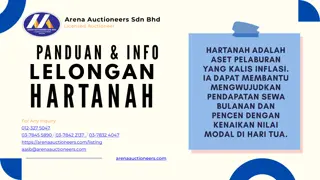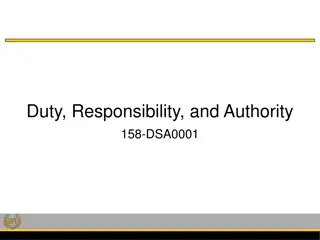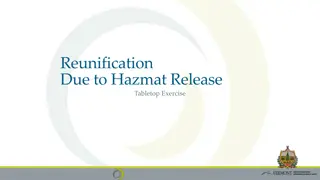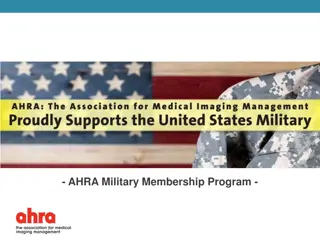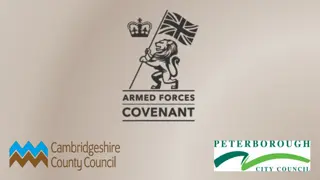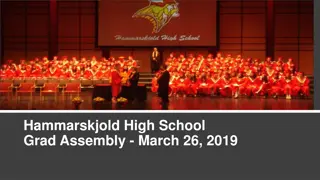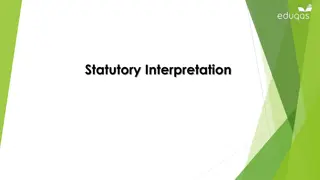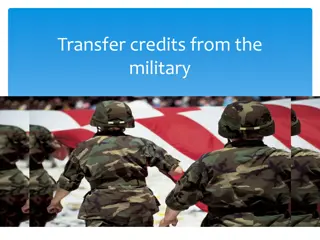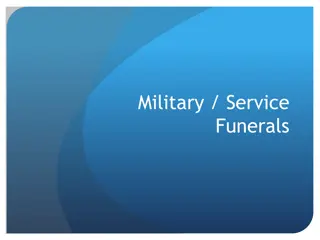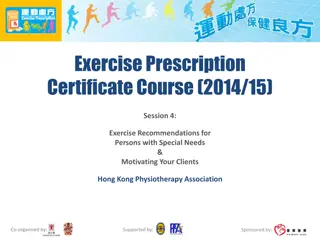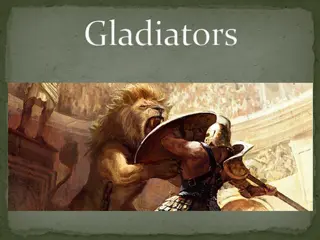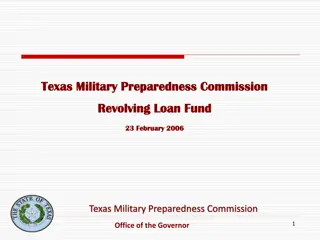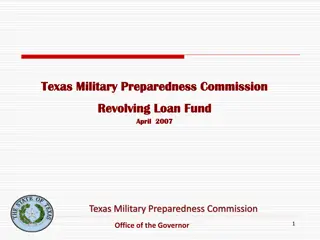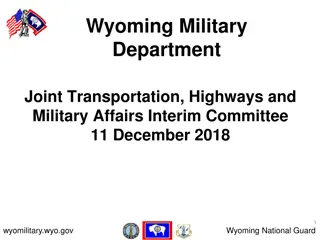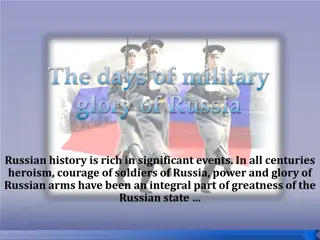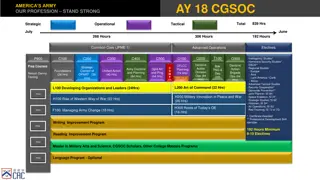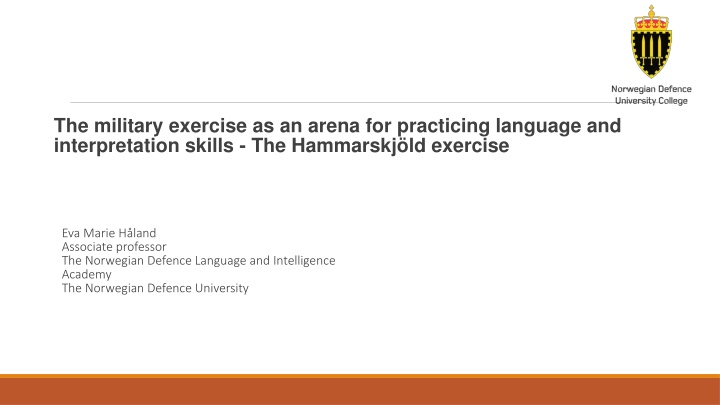
Military Exercise for Language and Interpretation Skills - The Hammarskjöld Exercise 2023".
Enhance language and interpretation skills through the Hammarskjöld Exercise 2023 held by the Norwegian Military Academy, focusing on complex operations involving high- and low-intensity warfare, insurgency, counterinsurgency, and peacekeeping. Participants include cadets, international forces, interpreters, role-players, and local community members.
Download Presentation

Please find below an Image/Link to download the presentation.
The content on the website is provided AS IS for your information and personal use only. It may not be sold, licensed, or shared on other websites without obtaining consent from the author. If you encounter any issues during the download, it is possible that the publisher has removed the file from their server.
You are allowed to download the files provided on this website for personal or commercial use, subject to the condition that they are used lawfully. All files are the property of their respective owners.
The content on the website is provided AS IS for your information and personal use only. It may not be sold, licensed, or shared on other websites without obtaining consent from the author.
E N D
Presentation Transcript
The military exercise as an arena for practicing language and interpretation skills - The Hammarskj ld exercise Eva Marie H land Associate professor The Norwegian Defence Language and Intelligence Academy The Norwegian Defence University
Content The Hammarskj ld exercise 2023 Role distribution Post-field activities for Arabic language cadets Evaluation and feedback Lessons learned
The Hammarskjld exercise 2023 Held by The Norwegian Military Academy Part of the course Complex Operations The course consists of three parts. Initially the course addresses the differences between high- and low intensity warfare, as well as irregular and complex conflicts. Part two is devoted to insurgency and counterinsurgency with an emphasis on understanding the premise, practice and criticism of population centric counterinsurgency. Part three focuses on peacekeeping operations, its inception and four stages of development. A particular attention will be given to protection of civilians. its ( ) a The practical parts of the module will utilize a variety of map-exercises, war-games and field training exercise. (www.forsvaret.no)
Scenario and actors Buskerud Telemark UN-mandated peacekeeping operation the International Stabilization Force (ISFOR) National Army of Telemark Telemark Police
The Hammarskjld exercise 2023 Participants: Cadets from The Norwegian Military Academy The International Stabilization Force (ISFOR) Cadets from The Norwegian Defence Language and Intelligence Academy Interpreters for the ISFOR forces or members of the Buskerudian and Telemarkian communities Role-players from the Norwegian Armed Forces and external role- players from various civilian institutions Members of the Buskerudian and Telemarkian communities, Telemarkian police as well various other roles
Cadets from the language and intelligence academy - 6th semester - Course: Arabic for intelligence personnel - interpretation in a military context
Post-field activities - Hot wash-up - Podcast production - Vocabulary review - Interpretation exercises - Physical exercise with Arabic instructions
Evaluation - Language training - Interpretation - Multilingual communication in military operations
Evaluation - language training Greater outcome than initially expected The opportunity to speak Arabic only for a long period of time leading to enhanced fluency and control The opportunity to confer with instructors and external role player Post-field activities: podcast and vocabulary drills
I experienced that we, in these conversations, have gone through a wide range of topics, for example medicine, the military, the United Nations, conflicts, military operations, food, daily life (family, place of residence, origin), and so on. This was rewarding, since I had to put the various topics into context That we had the chance to speak Arabic almost as much as we wanted. When we were with other Arabic-speaking role players, only our imagination restricted the topics we talked about. Therefore, we could benefit from exchanging opinions and questions about ways of expressing oneself in the different scenarios I experienced that being forced to speak a lot in front of strangers, with strangers and through an interpreter threshold for speaking next time. We therefore changed to an Arabic mindset for the entire day, where Arabic was associated not with school lessons, but rather treated as our everyday language lowers the
I had a moment of realization regarding amount of practice and self- confidence [ ] we just have to throw ourselves into it, make mistakes, misunderstand and make a fool of ourselves in order to achieve the progress in language that we need I was able to internalize the language to a greater degree than before, especially when it comes to standard formulations that are frequently used
Evaluation - interpretation Learning outcome on several aspects regarding the role of the interpreter: oThe role of the interpreter in a military context oPositioning oInterpretation ethics oTechniques oTurn-taking oNote-taking oTone of voice
We were a part of ISFOR, and no matter how often we said that we are merely interpreters, the local part would always regard us as ISFOR soldiers. This meant that positioning oneself in the conversation was even more important, as well as use of intonation and volume. As interpreters, we also face many challenges when interpreting for speakers who do not have experience with communicating through an interpreter. Specific challenges include taking turns and choice of words Interpreting an entire day in a new setting has made me gain greater insight into the challenges interpreters meet in the field. I am used to interpreting in calm surroundings where everyone involved interpreting means. This was not the case here. "At exercise Hammarskj ld, we have had the opportunity to make preparations, create relations to the persons in need of an interpreter, and experience the sense of responsibility one can feel as an interpreter on a military mission" knows what
The Hammarskjld exercise 2023 Being a civilian in conflict "What I want to take away from this experience is how important language and body language are for creating relations with others and for creating an emotional reaction in others. I want to become more aware of other people's body language, so that if I end up in a similar situation, I will be able to meet the person with compassion and empathy regardless of whether I understand the words they say. I have learned from the exercise that body language is in many cases more important than words, if you manage to read it correctly" "As a role player, I noticed how frustrating it is not to be understood when you need to convey so much important information counterpart" to a
Lessons learned - summarized High level of satisfaction with the achieved learning outcomes Post-field activities: Focus on vocabulary/terminology Increase the number of instructors Increase the number of external Arabic-speaking role players Improved coordination with the Military Academy prior to the exercise
Thank you! evhaland@mil.no


